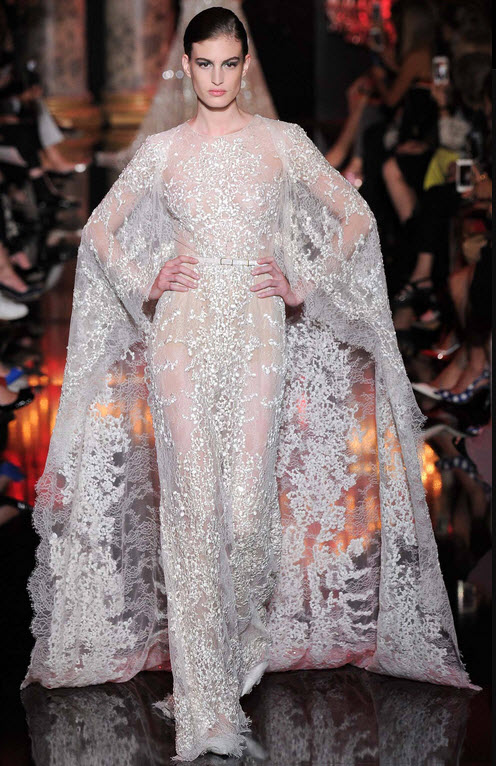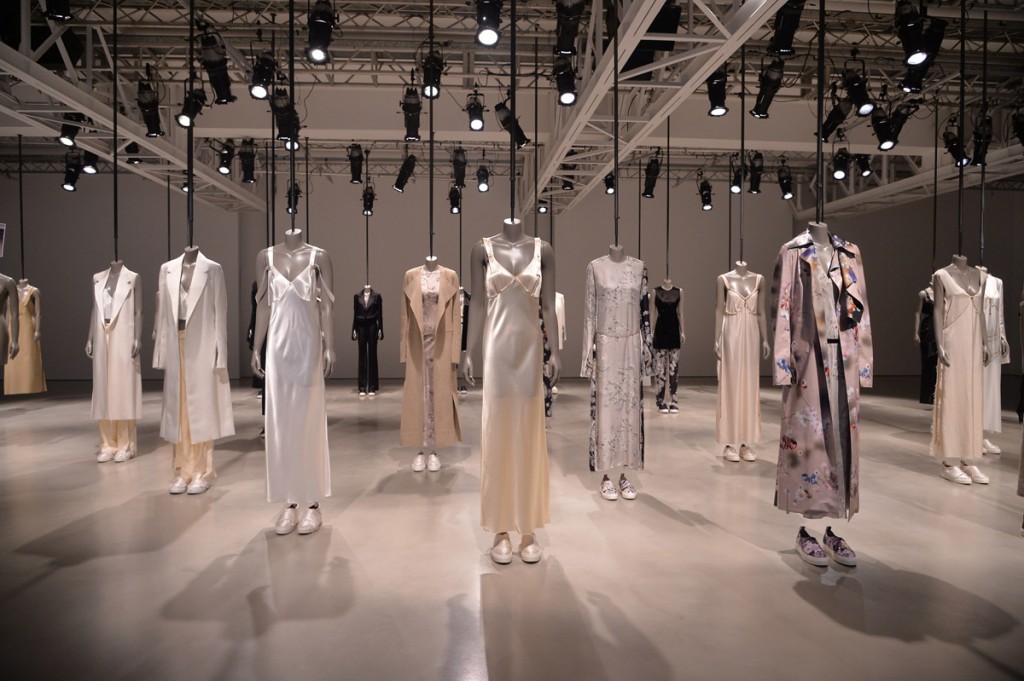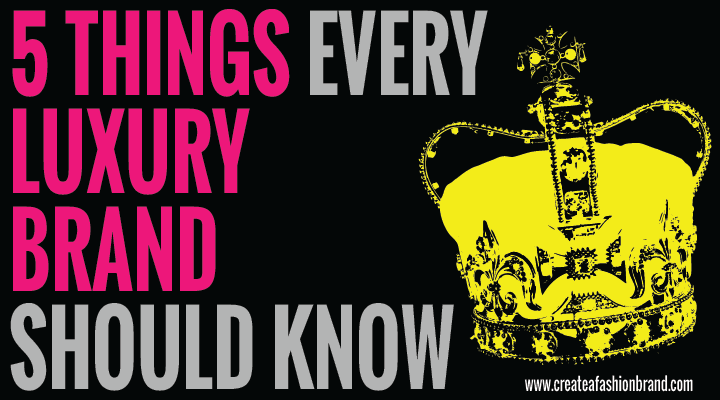So you’re thinking about starting a fashion brand or clothing line. You’re looking at business models and think that luxury is the way forward. Is it because you can design clothes with beautiful fabrics and trims? Maybe you like the idea of fame and being on the front cover of Vogue? Maybe you just think its smart business. Higher price tag equals more profit?…. well before you make your decision, here are 5 things you need to know about doing a luxury brand before you start.

COUNTERFEIT GOODS WILL CUT INTO YOUR PROFITS.
As new brands, I hear from clients that they have trademarked their brand and gained copyright for the designs that are eligible. Trademarking your brand image, isn’t a bad thing, but copyright for your products, is a pointless waste of time and money. Unless you are involved with something truly innovative, like tech or engineering, then you won’t be given copyright protection on something that is a common item. This will just cost you legal fees and a lot of time, that would be better spent developing your brand image.
Another thing to think about, is that, regardless of your legal rights, if your brand becomes popular, it will be copied somewhere in the world. Either by a factory looking to capitalise on a cheap version of your design, or by individuals who will go to a tailor with a picture and ask for it to be copied to their size.
If you’re worried about your profits, then you’ll find that because your price tag [as a luxury brand] is high, then there will be few people who can afford your clothing or products. Instead, they’ll buy a cheap illegal replica, or get a copy made.
If you’ve ever walked past one of these replica product market stalls, then I doubt you will have seen a cheaper, high street handbag, or clothing, copy. When clothing and accessories are cheaper to buy from an authentic brand store, then there is no point making illegal copies.
Apart from the legal and moral objections you might have to illegal copies of your products, this will definitely eat away at the profit you could expect. You should never assume that if consumers want to be seen wearing your label, that they are actually buying it legally from your store, or a licenced vendor.
If you want to look at a further example of how this could affect your branding and brand image, have a look at this blog post WHY GROUPON & OTHER DISCOUNT SITES, ARE BAD FOR YOUR BRAND, where I talk about the effect of cheap replicas on Burberry.
ONLINE SHOPPING DOENS’T WORK FOR LUXURY
Like most brands these days, luxury or not, you’ll be thinking of an online store. But the term ‘luxury’ is as much about the customer experience you provide as a clothing label, as it is about the quality of the products themselves.
The problem with e-commerce is that consumers can’t pick up, admire, or try the products, with a sales representative tending to their every need, including a glass of something bubbly in luxurious surroundings. The experience of online shopping, is not luxury at all.
I won’t say that luxury consumers don’t use e-commerce as a method of shopping, but it’s a very minimal amount of sales. As a new start up, you don’t yet have the brand recognition to be able to demand that level of trust from your consumer, especially when there are thousands of dollars on the price tag and even if you did, the likelihood is that consumers won’t buy online anyway. Customers who can afford luxury items, also want to be treated with a luxury experience. This means sales assistants, physical stores and pampering.
If you need some more facts on this, the average high street store does as much in online sales, as they do in a physical retail store. That’s around 48% of their sales revenue. In comparison, luxury brands sell less than 0.5% of their products through e-commerce.
This all means that that for a new luxury brand, you will have to concentrate on a physical store sales and lavish events, not e-commerce sales.
CLOTHING IS NOT THE MAIN FOCUS OF SALES. IT’S ACCESSORIES.
If your passion is clothing specifically, then luxury is definitely not the way to go with your brand.
Consumers buy products because they buy into the ‘lifestyle’ you have sold them through your brand marketing. But, luxury clothes are, well, luxury. They are expensive and in general, not every day items of clothing for most people, especially if you are intending on going down the bespoke or evening gown route.
Unfortunately, this means that only the very wealthy can afford to shop at luxury stores, of which there ae few and far between and when there is so much competition, you need to consider the location of these people for your brand. If you think back to providing ‘experience’ in your store, then customers are not going to travel for that experience, when they have other brands locally.
Moving on from that, the volume of consumers who provide you with the biggest profits [as a luxury brand], love the image and lifestyle that you are selling them, but often can’t afford big ticket items.

Instead, they opt for smaller things like perfume, sunglasses, bags or beauty, which gives them the illusion they have bought into your brand lifestyle, without spending large amounts of money. Or at least, large amounts of money compared to your other products. The smaller ticket items are still expensive for these consumers, but can be bought with a little saving, or on special occasions.
However these customers shouldn’t be ignored. They actually make up at least 75% of your annual sales. The amounts may be smaller in terms of price, but they are all sold at much higher volume. So in short, you are going to be far more dependent on the sales of accessories than clothing.
Unfortunately, this is where you run into a ‘chicken and egg’ situation. The clothing line, catwalk shows and marketing, provides the brand name and image, that allows those accessories to sell. So you need to create the clothing to develop your brand image and name, but your profits will be focused around the additional accessories that you sell alongside the clothing.
HIGHER PRICE MEANS MORE PROFIT
If like most people, you are assuming that a luxury brand will create more profits for you than a value brand, what you need to consider is the volume of sales.
Have you ever walked past a Gucci or Dior shop ad looked through the window? Busy, with hundreds of customers? No never.
Next time you’re walking past a luxury brand’s store, at a prime shopping hour or day, look in the window. Notice that there are very few, if any, people in the store. Then go to your local high street or shopping mall. Look at the amount of people in a store like H&M or Topshop. I’ll bet you’ll find quite a lot more.
It’s a myth that luxury brands make more money than your average high street, chain store.
High street brands sell products in huge volume, because the prices for their items are far more accessible to a lot more people. They allow for impulse purchases and customers with a lower disposable income. They’re accessible to far more people, because they tend to be in most high streets, or shopping malls, whereas luxury brands tend to be located in specific areas. All in all, they make more money.
Don’t believe me? Well let’s look at pure facts. The price for a Gucci handbag [and I’ve just checked] is between US $750 to $28,000. The average price is around US $3000, so these are the ones that will have the most sales. The price for a H&M handbag, is between US $9.99 and $49.99. The average is only US $24.99.
For H&M to sell US $3000 [the same as 1 average priced Gucci bag], they have to sell 120 average priced bags. That seems like quite a lot. But with online sales [which don’t apply to luxury, as we’ve already discussed] and multiple stores across the world, H&M will sell around 1000 bags on an average shopping day, whereas Gucci, will only sell 3.
So on an average shopping day, that’s H&M at US $24,990 and Gucci US $9,000…. Who would you rather be?

COSTS FOR START UPS
Actually we’ve covered this point in most of our other sections, but there are additional costs that make starting a luxury brand far more difficult.
I’ve mentioned already that:
- You don’t have the option of going online first, which is a cheaper, especially when you are starting out. If you do have some capital to launch in physical stores, your additional start-up costs, compared to a cheaper product brand, will go up. You’ll need sales representatives if you have an agreement with a department store, licencing staff, marketing campaigns, catwalk events and so on….
- Higher priced goods will mean less profit in terms of volume. Unfortunately you can’t do a lot about this. It will have to be a conscious choice that you should be aware of upfront.
- Clothing will not be the bulk of your profit. Accessories will be where people put their credit cards. However, you’ll need the clothing to create the brand name in order to sell the accessories.
But, there are more costs that you need to consider.
Because the value of your products is based on the value of your brand image, as a luxury brand, you’ll need to spend some time and money on this.
This will include:
- Big marketing campaigns.
- Very well done photoshoots, maybe on location, or in appropriate settings.
- Wide spread press coverage.
- You’ll also need to participate at fashion week, which has a huge cost as an individual event, but provides the prestige that your brand will need for luxury.
- You can’t sell cheap products at luxury prices. Products need to match up to what the customer is paying, so your production costs for luxury goods will be high and you’ll have to pay this out, fefore you get it back through sales.
HAUTE COUTURE
Well, I didn’t want to just give you 5 points to think about, especially when number 5 has been mentioned in most of the others. So here is an additional one to think about.
I’ve actually written a blog post about this previously, but it’s worth mentioning again here, just in case you didn’t read it. That blog post was called DOING COUTURE? WHY YOU MIGHT BE BREAKING THE LAW.
As a luxury brand, you may have dreams of Haute Couture fashions shows. But yes, you may have guessed from the title of the post that the term ‘Couture’ is actually protected by French law. Being designated as a Couture brand, has a number of restrictions and use of the term, will only be granted after you fulfil all of the criteria needed and apply to be able to use the term.
For more information on this, if you are interested, head over to the blog post HERE
FINALLY…..
So to sum up, if you are looking at the luxury market for no other reason than it seems appealing and easy, then don’t. This reason isn’t good enough. You’ll have restrictions, like not being able to sell online; having to consider costs for retail stores; creating clothing in order to sell accessories and perfume; you’ll have less profit margins for the cost of running a luxury brand and so on…..
As you can see, there is a lot to think about as luxury brands have to work differently to others. It all comes down to your target market and how they feel about your products. For a new brand, luxury is tricky, but not impossible, if you have enough funding.
But don’t panic. There are lots of clothing line markets that you can think about. Most of which, don’t have such high costs involved in starting up. If you’re interested in the different options and levels of brand then you might want to read THE MANY MARKET LEVELS OF FASHION BRANDS

Very nice. Thank you.